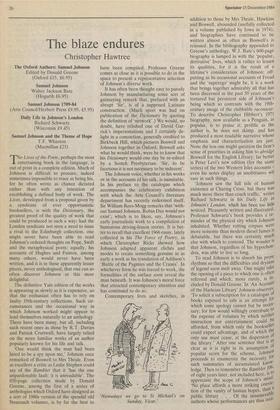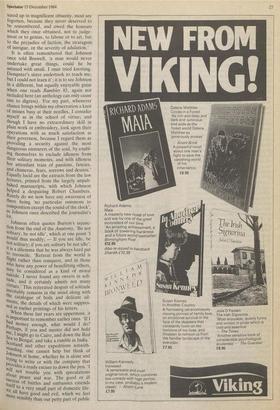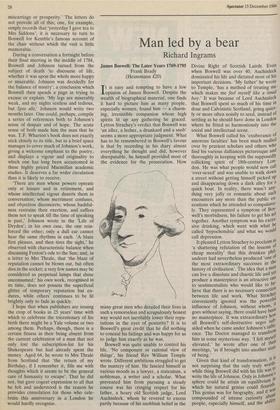The blaze endures
Christopher Hawtree
The Oxford Authors: Samuel Johnson Edited by Donald Greene (Oxford £15, £6.95) Samuel Johnson Walter Jackson Bate (Hogarth £6.95)
Samuel Johnson 1709-84
(Arts Council/Herbert Press £9.95, £5.95) Daily Life in Johnson's London Richard Schwartz (Wisconsin £9.45) Samuel Johnson and the Theme of Hope T.F. Wharton (Macmillan £25)
The Lives of the Poets, perhaps the most entertaining book in the language, is out of print in a complete edition. Much of Johnson is difficult to procure, indeed sometimes impossible to trace as being his, for he often wrote as chance dictated rather than with any intention of establishing a defined body of work. The Lives, developed from a proposal given by a syndicate of ever opportunistic booksellers, is with the Dictionary, the greatest proof of the quality of work that could be produced in such a way; had the London syndicate not seen a need to issue a rival to the Edinburgh collection, one might never have been able to read Johnson's ordered thoughts on Pope, Swift and the metaphysical poets; equally, his accounts of Hughes and Fenton, among many others, would never have been written, and it is in these apparently lesser pieces, never anthologised, that one can so often discover Johnson at this most delightful.
The definitive Yale edition of the works is appearing as slowly as it is expensive, so that the enthusiast often has to rely on faulty 19th-century collections. Such cir- cumstances and the occasional way in which Johnson worked might appear to lend themselves naturally to an anthology. There have been many, but all, including such recent ones as those by R.T. Davies and Patrick Cruttwell, have largely relied on the more familiar works of an author popularly known for his life and talk.
'One would think the man had been hired to be a spy upon me,' Johnson once remarked of Boswell to Mrs Thrale. Even as excellent a critic as Leslie Stephen could say of the Rambler that it 'has the one unpardonable fault: it is unreadable'. The 850-page collection made by Donald Greene, among the first of a series of anthologies which Oxford have designed as a sort of 1980s version of the spendid old Nonesuch volumes, is by far the best to
have been compiled. Professor Greene comes as close as it is possible to do in the space to present a representative selection of Johnson's diverse work.
It has often been thought easy to parody Johnson by manufacturing some sort of gainsaying remark that, prefaced with an abrupt 'Sir', is of a supposed Latinate construction. (Much sport was had on publication of the Dictionary by quoting the definition of 'network'.) We would, no doubt, have relished one of David Gar- rick's impersonations and I certainly de- light in a concoction, generally credited to Birkbeck Hill, which pictures Boswell and Johnson together in Oxford; Boswell asks what he would think, were he to know that his Dictionary would one day be re-edited by a Scotch Presbyterian: 'Sir, to be facetious it is not necessary to be indecent'.
The Johnson voice, whether in his works or in the accounts of his talk, is inimitable. In his preface to the catalogue which accompanies the celebratory exhibition with which the Arts Council's literature department has recently redeemed itself, Sir William Rees-Mogg remarks that 'with- out Samuel Johnson, Robin Day would not exist'; which is to liken, say, Johnson's early journalistic work to a compilation of humorous driving-lesson stories. It is bet- ter to recall that excellent 1966 essay, lately collected in his The Force of Poetry, in which Christopher Ricks showed how Johnson adapted apparent clichés and modes to create something genuine in as early a work as his translation of Addison's 'Battle of the Pygmies and the Cranes'. In whichever form he was forced to work, the formalities of the surface soon reveal the man beneath. It was Johnson's moral force that attracted contemporary attention and has continued to do so.
Contemporary lives and sketches, in 'Nowadays we go to St Michael's on Sunday, Vicar.' addition to those by Mrs Thrale, Hawkins and Boswell, abounded (usefully collected in a volume published by Iowa in 1974), and biographies have continued to be written almost as often as Boswell's is reissued. In the bibliography appended to Greene's anthology, W.J. Bate's 600-page biography is lumped in with the 'popular, derivative' lives, which is rather to lessen its qualities, for it is the result of a lifetime's consideration of Johnson; off- putting as its occasional accounts of Freud and the 'superego' might be, it is a work that brings together admirably all that has been discerned in the past 50 years of the tortured but persistent side of Johnson's being which so contrasts with the 19th- century image of the clubbable raconteur. To describe Christopher Hibbert's 1971 biography, now available as a Penguin, as popular, is to praise it; prolific as the author is, he does not skimp, and has produced a most readable narrative whose emphasis and characterisation are just. None the less one might question the firm's sense of priorities in asking him to abridge Boswell for the English Library; far better is Peter Levi's new edition (for the same series) of the two Western Isles accounts :- even his notes display an unobtrusive wit rare in such things. 'Johnson saw the full tide of human existence at Charing Cross, but there was much more there than coach traffic,' writes Richard Schwartz in his Daily Life in Johnson's London, which has been too little noticed. Pleasantly written and illustrated, Professor Schwartz's book provides a re- minder of the physical city which Johnson inhabited. Whether rotting corpses were more noisome than modern diesel fumes Is debatable, but there was certainly much else with which to contend. The wonder is that Johnson, regardless of his hypochon- dria, was able to live so long. To read Johnson is to absorb his prose rhythms so that the difficulties and dryness of legend soon melt away. One might take the opening of a piece to which one is often referred and which, more rarely, is In- cluded by Donald Greene. In 'An Account of the Harleian Library' Johnson observes; 'To solicit a subscription for a catalogue (”. books exposed to sale is an attempt for which some apology cannot but be neees- sary; for few would willingly contribute to the expense of volumes by which neither instruction nor entertainment could be afforded, from which only the bookseller could expect advantage, and of which the; only use must cease, at the dispersion 0' the library.' After one sentence that is as, clear as it is right in its assumption el popular scorn for the scheme, Johnson proceeds to enumerate the necessity for such summaries of accumulated kn°''''fr ledge. Then to remember the Rambler 106, of eight years later, not included here, IS appreciate the scope of Johnson's mlnu.: 'No place affords a more striking convie tion of the vanity of human hopes, than 3 public library . . . Of the innumerable authors whose performances are thus trea
sured up in magnificent obsurity, most are fogotten, because they never deserved to be remembered, and owed the honours Which they once obtained, not to judge- ment or to genius, to labour or to art, but to the prejudice of faction, the stratagem of intrigue, or the severity of adulation.'
It is often remembered that Johnson once told Boswell, 'a man would never undertake great things, could he be amused with small. I once tried knotting. Dempster's sister undertook to teach me; but I could not learn it'; it is to see Johnson
in a different, but equally enjoyable guise When one reads Rambler 85, again not included here (an anthology can only cause one to digress). Tor my part, whenever chance brings within my observation a knot of misses busy at their needles, I consider myself as in the school of virtue; and though I have no extraordinary skill in Plain work or embroidery, look upon their operations with as much satisfaction as their governess, because I regard them as Providing a security against the most dangerous ensnarers of the soul, by enabl- ing themselves to exclude idleness from their solitary moments, and with idleness her attendant train of passions, fancies, and chimeras, fears, sorrows and desires.' Equally lucid are the extracts from the law lectures, printed from the largely unpub- lished manuscripts, with which Johnson helped a despairing Robert Chambers. Rarely do we now have any awareness of there being 'no particular summons to composition except the sound of the clock', as Johnson once described the journalist's lot.
Johnson often quotes Burton's injunc- tion from the end of the Anatomy, 'Be not solitary; be not idle', which at one point 'I would thus modify; — If you are idle, be not solitary; if you are solitary be not idle'; it is a dilemma that he was always hard put to reconcile. 'Retreat from the world is night rather than conquest, and in those who have any power of benefitting others, utaY be considered as a kind of moral suicide. I never found any sweets in soli- tude, and it certainly admits not many virtues. This reiterated despair of solitude Inevitably remains in the mind along with tIC catalogue of boils and delicate ail- ments, the details of which were suppres- sed in earlier printings of his letters. , When these last years are uppermost, it is important to remember earlier ones. 'If I u„ad money enough, what would I do? erhaps, if you and master did not hold yrne, I might go to Cairo, and down the Red ea to Bengal, and take a ramble in India.' Zcotland and other expeditions notwith- j "ding, one cannot help but think .of .ohnson at home, whether he is alone and LrYing to write or with the company that ,V ides a ready excuse to down the pen. 'I _7,111 not trouble you with speculations s4uoout peace and war. The good or ill iteciess of battles and embassies extends ,:ed. to a very small part of domestic life: _'ve all have good and evil, which we feel more sensibly than our petty part of public
miscarriage or prosperity.' The letters do not provide all of this; one, for example, simply records that 'yesterday I gave tea to Mrs Siddons'; it is necessary to turn to Boswell for Kemble's famous account of the chair without which the visit is little memorable.
During a conversation a fortnight before their final meeting in the middle of 1784, Boswell and Johnson turned from the subject of death 'to discourse of life, whether it was upon the whole more happy or miserable. Johnson was decidedly for the balance of misery'; a conclusion which Boswell then spends a page in trying to excuse or explain. 'My legs are miserably weak, and my nights restless and tedious, but Spes alit,' Johnson would write two months later. One could, perhaps, compile a series of references both to Johnson's sense of despair and of hope. The acute sense of both made him the man that he was. T.F. Wharton's book does not exactly stick closely to its title, but in a brief space manages to cover much of Johnson's work, giving a welcome emphasis to the poetry, and displays a vigour and originality to which one has long been accustomed in these highly priced Macmillan academic studies. It deserves a far wider circulation than it is likely to receive.
'There are men whose powers operate only at leisure and in retirement, and whose intellectual vigour deserts them in conversation; whom merriment confuses, and objection disconcerts; whose bashful- ness restrains their exertion, and suffers them not to speak till the time of speaking is past,' Johnson wrote in the 'Life of Dryden'; in his own case, the one rein- forced the other; only a dull ear cannot hear the same rhythms in each. 'A blaze first pleases, and then tires the sight,' he observed with characteristic balance when discussing Fenton's ode to the Sun; and, in a letter to Mrs Thrale, that 'the blaze of reputation cannot be blown out, but often dies in the socket; a very few names may be considered as perpetual lamps that shine unconsumed;' his own work, recognised in its time, does not possess the superficial glitter of temporary reputation but en- dures, while others' continues to be lit brightly only to fade as quickly.
I hope that when publishers are issuing the crop of books in 25 years' time with which to celebrate the tricentenary of his birth there might be a Yale volume or two among them. Perhaps, though, there is a certain fitness in their being absent from the current celebration of a man that not only lost the subscription-list for his Shakespeare but had already spent the money. Aged 64, he wrote to Mrs Thrale from Scotland that 'the return of my Birthday, if I remember it, fills me with thoughts which it seems to be the general care of humanity to escape'. That he did not, but gave cogent expression to all that he felt and understood is the reason he provides consolation for those who cele- brate this anniversary in a London he would hardly recognise.




















































 Previous page
Previous page